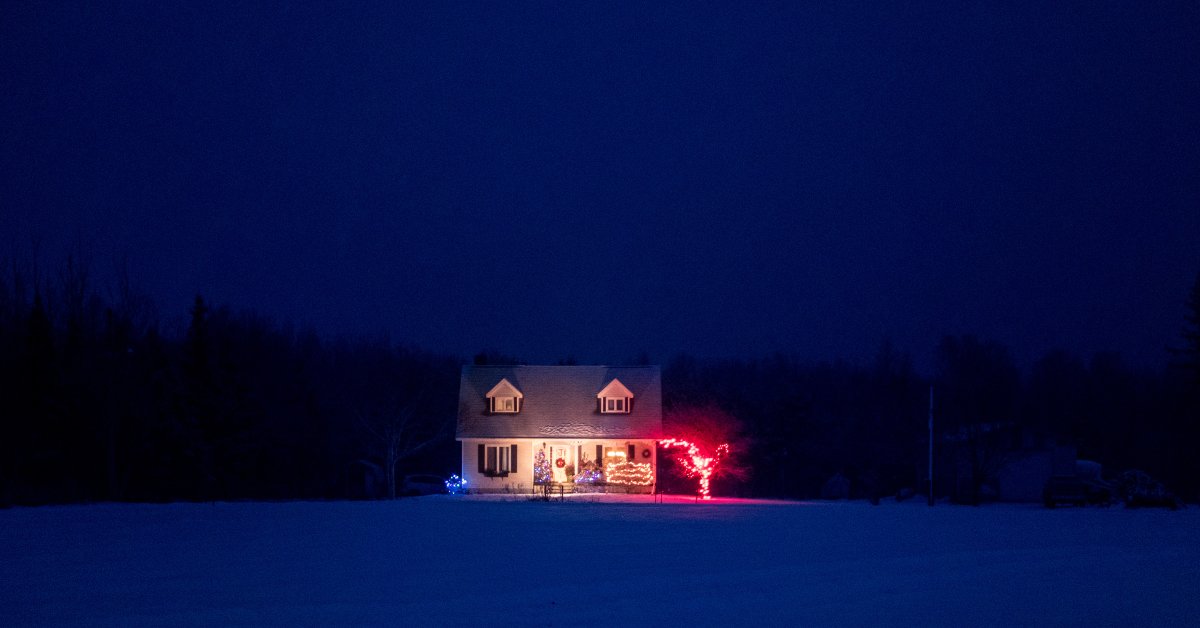In 2020, I woke two weeks before Christmas, and my church was engulfed by flames. During the night, fire spread from an abandoned building and, by the time I woke, it was an inferno. Despite heroic work by New York City firefighters, in the morning our sanctuary was gone—breathtaking wood and stone reduced to rubble by a six-alarm fire. My beautiful community, already grieving the loss of connection due to the COVID-19 shutdown, was devastated; the fire magnified our grief.
While this trauma is particular to Middle Church, what I know through my work as a clergy and psychologist is how so many of us have lived through our own fires these last years: The incessant blaze of racism and rising fascism; families fractured by divisive political discourse; relationships broken by baked-in biases; a global pandemic and the psycho-social effects of worry and isolation.
In the whirlwind, so many are feeling frightened, weary, and alone. This holiday season only exacerbates those feelings.
Read More: How To Create a Sense of Belonging In a Divided America
In every season, no matter our orientation, how we look or whether we practice any faith, humans yearn to be seen, known, and loved. We flourish in connectivity; we long to belong. The messages we see in the media around the holidays depict families eating, playing, and praying together. There are idealized images of holiday shopping and beautiful people romping in the snow or dancing at parties that can leave us feeling outside of those stories.
Further, holiday stress can be difficult on families. Many of us suffer grief, as we recall painful past experiences with regret, or recall treasured days now absent of joy.
The economy is in a rut, while our children are fed a diet of all the presents Santa will bring, things budgets can’t bear. Talk at the dinner table can turn as toxic as it is in social media and in the public square. Too often, we regress to old patterns of behavior that no longer serve us. We feel compelled to perform joy when we want to weep.
I know; I’ve been there, crying in the ashes.
What happens when the busyness ends
The immediate aftermath of any tragedy or loss is full of action. While bricks still smoldered, church members were busy buying clothes and essentials for people displaced from the shelter next door. When the pandemic first struck, we scurried to get masks and rapid tests, to keep ourselves and loved ones safe. After a police shooting, we protested in the streets. When we lose a loved one, we are filled with the work of planning a memorial, settling affairs, and tending to the grief of others.
However, after the initial crisis, frenzied action gives way to waiting and time begins to stretch. This, for me, is the hardest part: The long and lonesome hours when we are left to sit with the enormity of what we have lost. Moreover, worldly trauma has a way of triggering personal pain, reopening scars we thought had healed. As if grieving our sanctuary wasn’t enough, I found myself wading through other wounds: The loss of my mother to an eight-year battle with lung cancer; the dissolution of a marriage; the vile and racist attacks I experience as a Black female activist. Adrift amid catastrophe, these memories and more haunted me—rattling chains, demanding to be heard.
Maybe your ghosts look like mine. Perhaps they’re different. But all of us have experienced suffering, and both theologians and psychologists remind us that this pain does not end when we cease to feel it. More often, it retreats into the recesses of our soul only to emerge when we are vulnerable. Grief, anxiety, and depression can make us feel isolated—particularly when it seems the rest of the world is filled with tinsel and carols. But if you’re feeling lonely, know that you’re not alone.
What I found amid my grief was the fiercest love manifested as courage from my communities and tenderness for myself. Just like Jesus was born amid trauma, beauty finds us where we need it most.
One of the great joys of community is how people can reflect your situation in ways that do not diminish the enormity of what you experience, but also refuse to let you wallow in sadness. People who know me well would affirm, “If anyone can make it through these difficult days, it’s you Jacqui. And we’ve got you!” Similarly, it was my siblings who reminded me, honestly, “Mom’s death was so hard, but her love is ever-present.” Truth is a prerequisite for healing; we can’t move beyond suffering without it.
When I began to sit with the weight of present-day anguish and long-shrouded pain, I was forced to realize that I had not been loving myself well. The perfectionism I developed as a childhood defense mechanism had hardened, shielding me from trauma I had buried. Again and again, I wrapped myself in work, hoping that—if I achieved enough—I could avoid reckoning with my hurt. But that long-deferred bill was due. Perfectionism wasn’t enough; I needed gentleness.
What’s love got to do with it
Some think it is trite to suggest loving ourselves better to process trauma. And yet, true compassion for who we are—including our flaws, our anxieties, our imperfections—is at the heart of any recovery. Personal affirmations aren’t narcissism, they’re what help us know and own our belovedness.
My beloved professor, Dr. James Loder, wrote, “Love is a non-possessive delight in the particularity of the other.” I was transformed by this notion. Non-possessive delight. Not demanding, not judgmental, not waiting to change the object of your affection into who you want them to be. Delight in the particularity. Quirks and super-powers. Beauty and flaws.
Children develop best when caregivers provide a nurturing mirror, reflecting and naming their growth. As adults, we can give ourselves that gift: To look at what we’re experiencing honestly, and name that we are finding our way through it. At a time of year when we’re encouraged to think about others, I pray that you find time to celebrate yourself. We can give ourselves the kind of love Loder describes. Delight in our particularities, without judgement or shame. See our quirks and prickly bits alongside our shining light and beauty and love it all. You are your own best thing; leaning into this kind of love for you is a rehearsal for loving those around you.
This powerfully resonates with my favorite part of the Christmas story. When Mary discovers she is pregnant, she ought to be terrified. Shame, even death, could be the consequences for pregnancy outside of marriage. And yet, despite those harrowing circumstances, Mary begins to sing: “God has done great things for me. Surely all generations will call me blessed.” Mary looks at herself, in the middle of what ought to destroy her, and uses that moment to proclaim her sacredness. In a patriarchal society, she defines her own self-worth. She transforms a moment of profound loneliness and alienation into a celebration, not because she has changed her circumstances but because she has changed how she sees and loves herself.
How to weather this season
If you’re lonely this holiday season, try to find community. Seek out people who can honestly reflect what you are experiencing and help you dream beyond it. Start with the one friend or colleague you know might also be lonely. Be intentional, ask for what you need. Set up a coffee meet-up. Think of the event you can host for a few people in your building. Which holiday movie wants to be watched in a group, with popcorn and hot chocolate? Set up time with your far-away cousins to check-in during halftime, or FaceTime that person with whom you exchanged numbers in a moment of spontaneity. See what happens.
As you search for connection, reserve some compassion for yourself. Name what you have been through and celebrate your resiliency. Create a journal; reflect on your story. Where have you overcome obstacles, making yourself proud? What are the “do-overs” you desire and how can you make amends? Nurture yourself by celebrating that you are on the planet, wonderfully becoming a better you as you breathe. Know that it is likely you and I will not return to how things used to be. But here is the thing about transformation: We don’t leave these hard moments as we went in.
And if you’re alone? Let yourself feel the aloneness and see what lessons it has for you, about who you are, what you love, and how to love you better. Make a date with yourself and do that thing. Turn on the music and draw a bath. Alone does not have to be lonely.
Read More: Patton Oswalt: How to Conquer Loneliness During the Holidays
When we make loving ourselves a prime objective, our self love will be a source of comfort, not only during the holidays but throughout the year. We see more clearly how we are connected to our neighbors. We come to understand that though it may feel like we are adrift at sea, others are swimming nearby. In the spirit of Ubuntu—a human is a human through other humans—we are all inextricably connected. Compassion for our yearning yields empathy for others’ desires. That empathy nurtures connection. Loving ourselves generates the energy we need to love our neighbors. This dynamic is what satisfies our longing to belong.
Two years later, Middle Church is rebuilding. We’ve raised millions in a capital campaign to fund a new center for spirituality, justice, and the arts in Manhattan’s East Village, and expect to break ground soon. I am healing, too. I wrote Fierce Love, a memoir about how you and I can rise from ashes with courage and kindness. My father and enjoy a newfound tenderness, that has healed us both.
More than anything, I’ve found ways to see and nurture myself. Self-love can heal our endemic loneliness because it breaks the relentless cycle of depression and self-criticism to name the truth: You are holy, fearfully, and wondrously made. Even though you have suffered, that suffering does not define who you are, and it does not control your future. You are capable of goodness and beauty. Love can make you well. Come home to yourself, with love.
More Must-Reads From TIME



